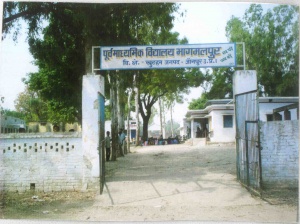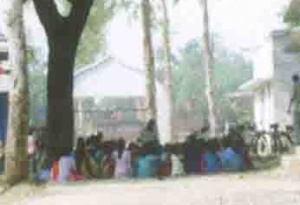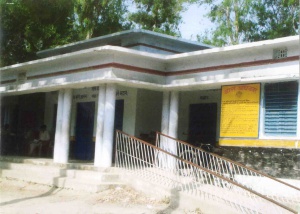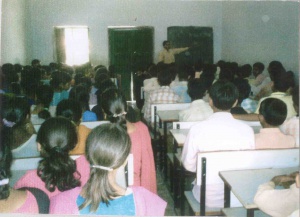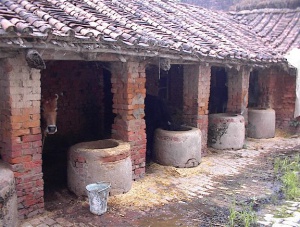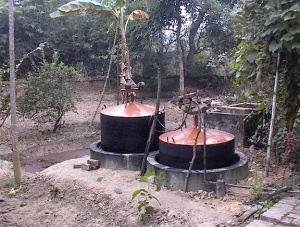OLPC India/Bhagmalpur: Difference between revisions
| Line 131: | Line 131: | ||
== Impediments == |
== Impediments == |
||
* Electricity: Bhagmalpur is on the grid, but electricity is sketchy at best. Households in the village opt to use solar, gobar gas (cow dung biodigestors) and kerosene lanterns for lighting. Some places use gobar gas or traditional chulha (small fireplace) for cooking. Some households use LPG (Liquified Propane Gas) but gas tanks that have to be taken to Shahganj for refilling/exchanges. |
* Electricity: Bhagmalpur is on the grid, but electricity is sketchy at best. Households in the village opt to use solar, gobar gas (cow dung biodigestors) and kerosene lanterns for lighting. Some places use gobar gas or traditional chulha (small fireplace) for cooking. Some households use LPG (Liquified Propane Gas) but gas tanks that have to be taken to Shahganj for refilling/exchanges. |
||
[[Image:Gobarpower.jpg|thumb|Source of Gobar (cow dung) for Biodigestor]] |
|||
[[Image:Bhagmalpur-Gobargas.jpg|thumb|Gobar Gas (Cow Dung) Biodigestor]] |
[[Image:Bhagmalpur-Gobargas.jpg|thumb|Gobar Gas (Cow Dung) Biodigestor]] |
||
* Internet access: This can be provided via CDMA, but currently there is no setup for Internet access. |
* Internet access: This can be provided via CDMA, but currently there is no setup for Internet access. |
||
Revision as of 21:34, 3 August 2008
Demographics
School
पूर्व माध्यमिक विद्यालय Poorva Maadhyamik Vidyalaya (Pre Middle School)
Village
Bhagmalpur भागमलपुर
Location
Approx. 10 km south-southwest of Shahganj, UP
District
Jaunpur जौनपुर
State
Uttar Pradesh उत्तर प्रदेश
Nearest Railway Station
Shahganj शाहगंज
Nearest State Transport Bus Stop
Banuwadeeh बनुवाडीह
Postal address
Village and Post Office Bhagmalpur
Khutahan Development Block
District Jaunpur
Uttar Pradesh, 223104, India
School Description
Building
The school has one main structure, which houses the uppder level classes inside. The other classes are still held classical style - under a tree.
Student density
Subjects taught:
| Hindi, Mathematics | |
| Hindi, Mathematics | |
| Hindi, Mathematics, English, Sanskrit, Social Science, History, Geography | |
| Hindi, Mathematics, English, Sanskrit, Social Science, History, Geography | |
| Hindi, Mathematics, English, Sanskrit, Social Science, History, Geography | |
| Hindi, Mathematics, English, Sanskrit, Social Science, History, Geography, Agricultural Science, Sports, Physical Training, Environmental Science, Civics Home Science (girls) | |
| Hindi, Mathematics, English, Sanskrit, Social Science, History, Geography, Agricultural Science, Sports, Physical Training, Environmental Science, Civics Home Science (girls) | |
| Hindi, Mathematics, English, Sanskrit, Social Science, History, Geography, Agricultural Science, Sports, Physical Training, Environmental Science, Civics Home Science (girls) |
The school is run by the state government of Uttar Pradesh. The UP government provides books and a mid-day meal. Currently, there are no computers and there is no Internet access. The nearest private school with a computer is in a village a few miles away.
Impediments
- Electricity: Bhagmalpur is on the grid, but electricity is sketchy at best. Households in the village opt to use solar, gobar gas (cow dung biodigestors) and kerosene lanterns for lighting. Some places use gobar gas or traditional chulha (small fireplace) for cooking. Some households use LPG (Liquified Propane Gas) but gas tanks that have to be taken to Shahganj for refilling/exchanges.
- Internet access: This can be provided via CDMA, but currently there is no setup for Internet access.
- Governance/administration: As this is a UP government school, implementing an OLPC-based solution will require some “blessings”.
- Curriculum:Considering that curriculum is not computer-based, transition to a computer-based or computer-mediated environment will be difficult.
Deployment
- Pilot approach (preferred): To implement a pilot study with one of the lower class levels such as 1st or 4th class. This will require a smaller batch of XOs and can be sustained by a mesh architecture.
- Full Deployment: A complete deployment will require over a thousand XO units, and will not work on a mesh configuration. This will require APs and a significant amount of Wi-Fi space management.
Both approaches can serve to be an important research test bed for sustainable IT, adoption of computer-mediated education, curriculum development, etc.
Time frame
We would like to get the project initiated around October or November of 2008, followed by planned, but frequent assessments.
Funding
As is the case with most deployments, the potential owners of the Xos and their families cannot afford to pay for these technologies. The funding for this project will have to come from a research grant, donation, or some combination thereof.
Why Bhagmalpur?
While Bhagmalpur seems to be a classic village for such a project, there are thousands of such villages in India that could use these resources. The reason I am looking at Bhagmalpur is a bit personal: my family lives there.
I am a professor of Information Systems in the College of Business at San Francisco State University (http://verma.sfsu.edu/). My research topics are related to diffusion and adoption of innovative technologies. My current focus is on the diffusion and adoption of Free and Open Source Software.
The school mentioned above was started by my family many years ago, but was transferred to the UP government later on. We have lived in this village for many generations. Our ancestry can be traced back to the days of Mughal Emperor Akbar (mid to late 1500s), so our family has a vested interest in the education and general upliftment of the quality of life in Bhagmalpur. Knowing and understanding the local community is important in terms of assessing the needs and providing apt solutions.
In a sense, I have witnessed both the supply side and the demand side of this project, the demand being in Bhagmalpur, and the supply being the terrific worldwide FOSS community and the OLPC project. Putting the two together is of professional and personal interest to me.
